

Server backup software is a specialized tool or system designed to capture and store copies of the data contained within a server. This ensures that in the event of any unforeseen data loss scenarios — whether from system failures, accidental deletions, malware, or any other disruptions — there’s a backup available from which the data can be restored.
To help you navigate the intricacies of data protection for servers and similar machines and sort through the many available options, we picked the top six server backup software solutions that have been making waves in 2023.
Each of these has been handpicked based on its efficacy, features, and user reviews. We also explore the quintessential features that make a server backup software stand out and, most importantly, guide you on choosing the one that aligns best with your organizational needs.
Navigating the complex realm of server backup solutions can be daunting, given the myriad of options available. To simplify your decision-making, we’ve compiled a comparative table highlighting the key features of the top six server backup software for 2023.
This at-a-glance resource will provide insights into each software’s capabilities, helping you pinpoint the solution best suited for your business needs.
| Data backup types | Data deduplication | Disaster recovery | Security | Starting price | |
|---|---|---|---|---|---|
| Acronis Cyber Protect | Incremental, differential, and scheduled backups | Yes | Yes | Anti-malware, anti-ransomware, anti-cryptojacking | $85 for one year license |
| IDrive Server Cloud Backup | Automatic, scheduled, and manual backups | Yes | Yes | HIPAA, SOX, GLBA, and SEC/FINRA compliance; 256-bit AES encryption; optional private key | Basic plan is free; $9.95/month for IDrive® Personal for one user with multiple machines |
| Carbonite | Automatic, continuous, and scheduled backups | No | No | Ransomware scanning, alerting, and remediation | $24.00/month for Carbonite Safe® – Core for up to 25 computers |
| Veeam Data Platform | Forever forward incremental, forward incremental, reverse incremental | Yes | Yes | HIPAA, SOX, GLBA, and SEC/FINRA compliance; 2FA; end-to-end encryption | Contact sales for pricing; available in enterprise editions, universal licenses, and managed services |
| Backblaze B2 Cloud Storage | Automatic, continuous, and scheduled backups | Yes | Yes | HIPAA, SOX, GLBA, and SEC/FINRA compliance | $6/TB/month Pay-As-You-Go pricing structure |
| N-able Cove Data Protection | Automatic, scheduled, and manual backups | Yes | Yes | HIPAA, SOX, GLBA, and SEC/FINRA compliance; 2FA; end-to-end encryption | Contact sales for custom pricing |
Jump to:

Best for comprehensive data protection
Acronis Cyber Protect is an all-in-one cybersecurity solution that merges data protection and cybersecurity. It boasts features like backup, disaster recovery, anti-malware, antivirus protection, vulnerability checks, and patch management. Tailored for businesses of all sizes, it safeguards against cyber threats and data loss.
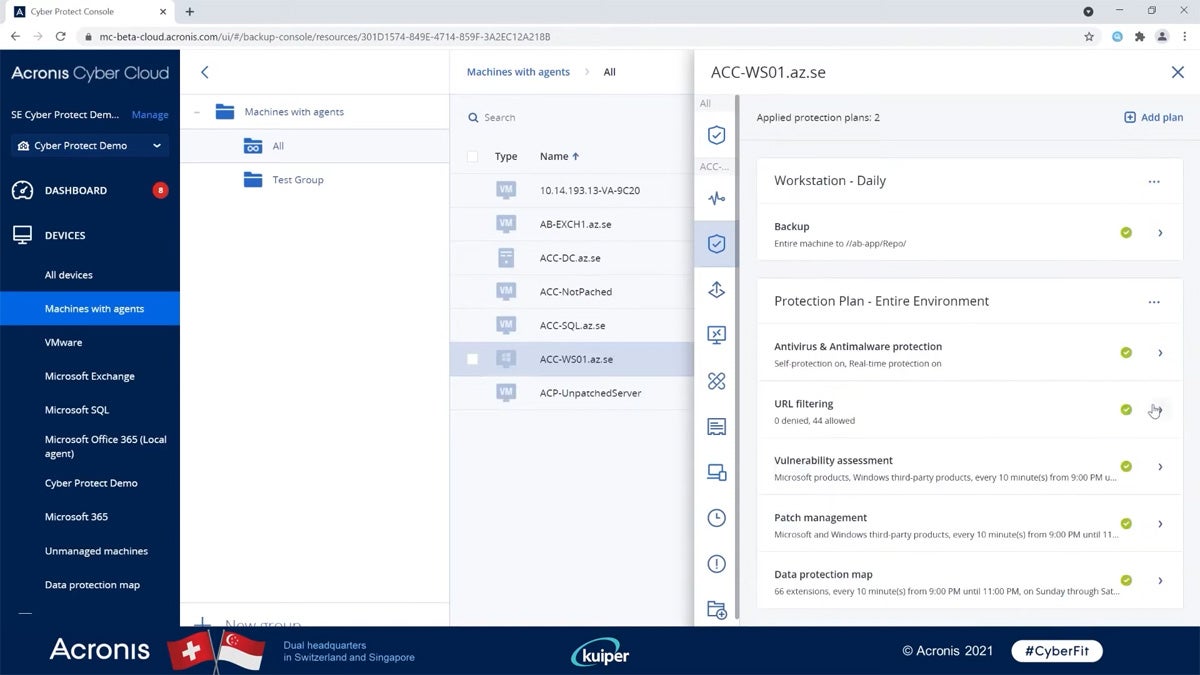
| Pros | Cons |
|---|---|
| Easy to install, manage, and create backups or clone disks. | Expensive for small companies. |
| High functional range, reliable, and easy to deploy and manage. | Some features, such as forensic backup and memory dump, may seem like overkill for small businesses. |
| Provides a full suite of data protection and cybersecurity capabilities. |
For more information, read the full Acronis review.

Best for cloud-centric backup
IDrive Server Cloud Backup is a cloud backup service tailored for businesses with server needs. It provides automatic data backup, unlimited storage, file versioning, and remote file restoration. One of the standout features of IDrive Server Cloud Backup is its automatic data backup. This ensures that businesses don’t have to manually back up their data, reducing the risk of human error and data loss.
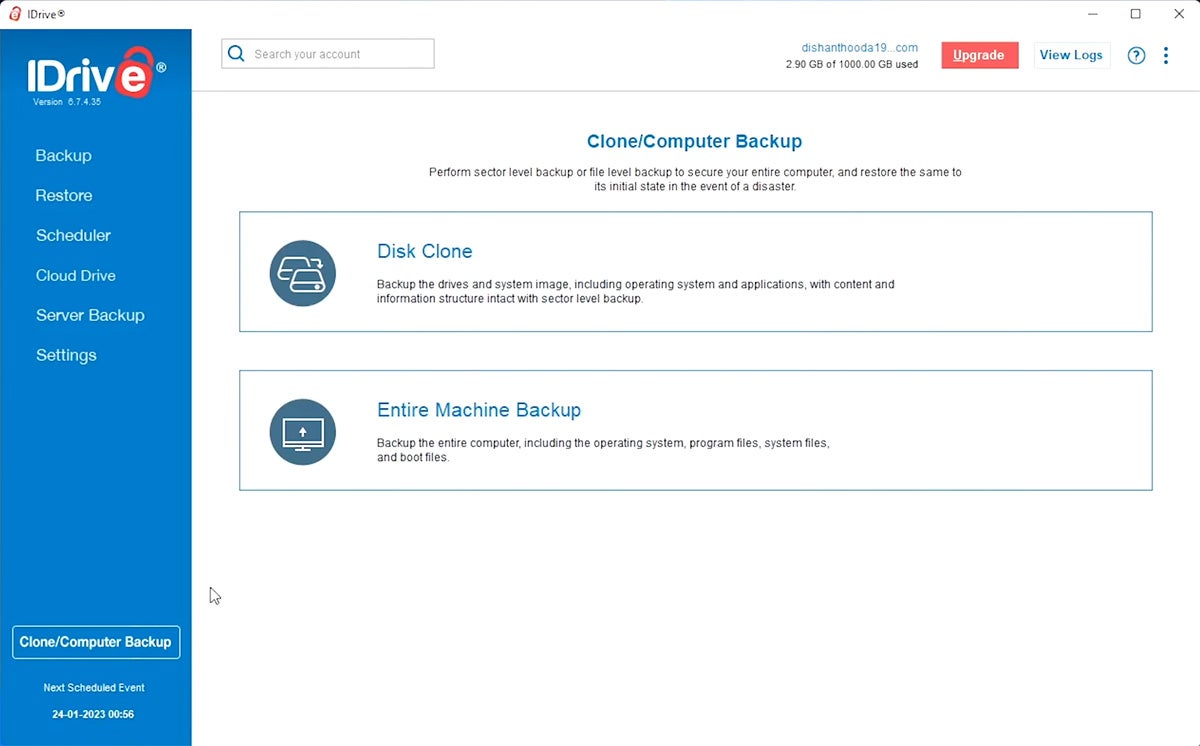
| Pros | Cons |
|---|---|
| Meets compliance mandates such as HIPAA, SOX, GLBA, and SEC/FINRA. | The user interface may require an adjustment period. |
| Features IDrive BMR, an onsite solution for bare-metal disaster recovery. | Initial backups can be resource-intensive, though resource usage can be adjusted. |
| Supports cloud replication, transferring server-stored backups to the cloud. |

Best for small and medium-sized businesses (SMBs)
Carbonite, with its cloud-based infrastructure, promises not only security but also ease of use for its users. One of the most appealing features of Carbonite is its promise of unlimited storage. This unlimited storage capability ensures that users don’t have to constantly manage or delete older backups to make space for new ones.
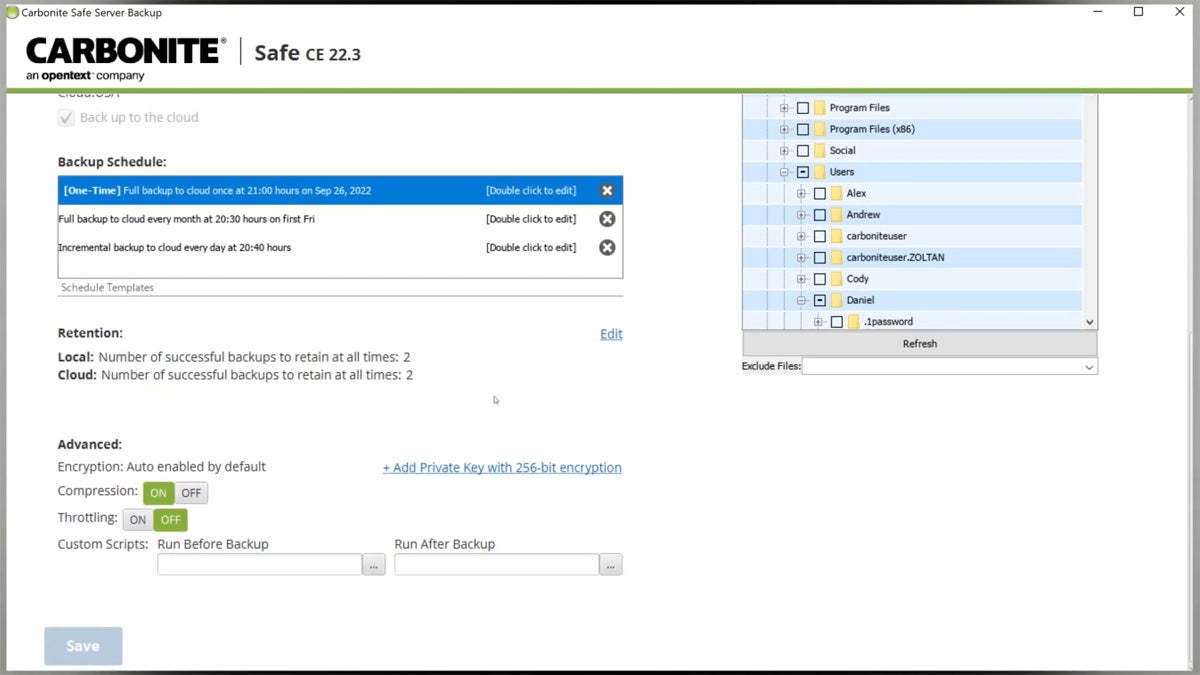
| Pros | Cons |
|---|---|
| Offers a user-friendly online backup service with unlimited storage. | Each subscription covers only 25 computers; additional licenses are needed for multiple computers. |
| The installation and configuration process is straightforward and intuitive. | External and network drive backups are limited to premium accounts. |
| Features easy-to-understand email reporting for backup sets. |

Best for virtualized environments
Veeam has meticulously crafted a platform that addresses not just one, but a myriad of data-related needs. From safeguarding data to ensuring its seamless accessibility and transfer, Veeam stands as a beacon of reliability and innovation. Complementing this is the platform’s replication capability, which allows for real-time data duplication, ensuring that there’s always a secondary copy available for immediate restoration.
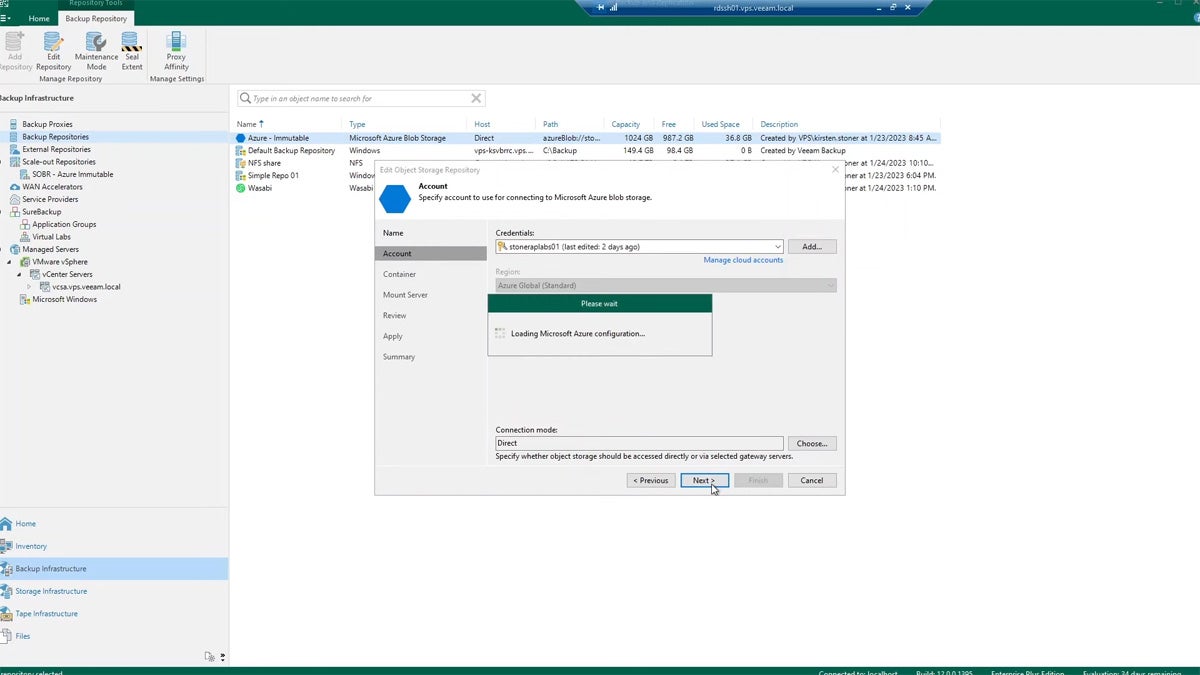
| Pros | Cons |
|---|---|
| Renowned for its top-notch customer support. | The initial setup can be cumbersome, requiring a package download and installation. |
| Automated backups are efficient and require minimal oversight. | Transitioning from a Windows server to a Linux server necessitates converting the existing model. |
| Offers a superior user experience compared to competitors. |

Best for cost-effective cloud storage
Backblaze B2 stands out not just for its affordability but also for its commitment to providing a seamless and secure storage experience. The platform places a strong emphasis on data security, as evidenced by its robust data encryption feature. This ensures that users’ data remains shielded from prying eyes and potential breaches.
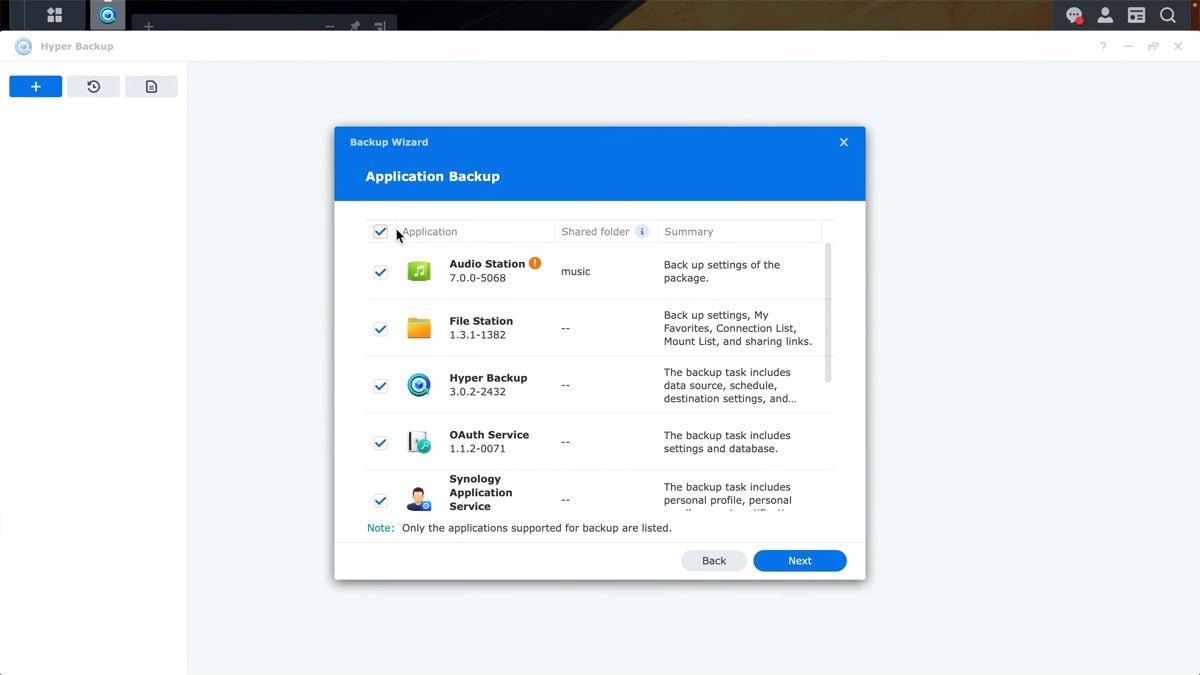
| Pros | Cons |
|---|---|
| Features an intuitive cloud storage and backup solution. | Limited sharing and syncing capabilities. |
| Offers an option to receive an external disk containing all your data via mail for local restoration. | Installation requires the OS to be updated to its latest version and can be time-consuming. |
| Comes with a command-line tool for terminal-based data uploads/downloads. |

Best for enterprise data protection
At the heart of N-able Cove’s offerings is its commitment to seamless data protection. The platform’s automatic data backup feature ensures that businesses can set and forget, with the confidence that their data is continuously being backed up without the need for manual intervention. This not only reduces the risk of data loss due to human error but also ensures that the most recent data is always available for recovery.
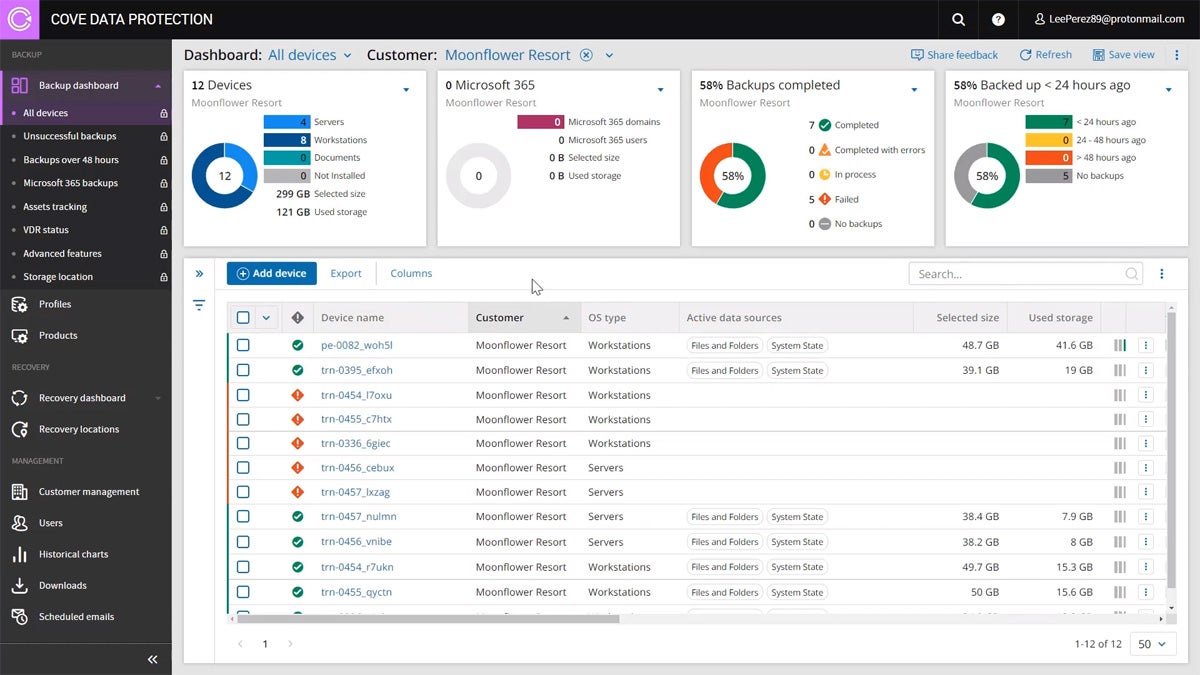
| Pros | Cons |
|---|---|
| Provides 24/7 support with knowledgeable staff. | Pricing structures can be ambiguous. |
| Installation and configuration are straightforward. | Some users might find N-able Cove Data Protection lacking in advanced features. |
| Represents a cutting-edge solution in backup technology. |
Server backup software plays a pivotal role for businesses and organizations, serving as a bulwark against data losses from unforeseen adversities, unintentional deletions, and malicious cyber onslaughts.
In this section, we explore the essential features that a server backup software should have, from data backup types to reporting capabilities.
Backup solutions are not one-size-fits-all. A wide array of backup types cater to different organizational needs.
Regularly balancing between these backup types can lead to both comprehensive data protection and efficient resource utilization, catering to both immediate recovery and long-term archival needs.
Data redundancy can often lead to wastage of storage space and increased backup durations. Data deduplication emerges as a solution to this problem. By eliminating redundant copies and ensuring that only unique instances of data are stored, deduplication conserves vital storage space.
Beyond mere conservation, this process optimizes the backup process, drastically reducing the amount of data that needs to be moved, which is especially beneficial for organizations with vast data repositories. By reducing redundancy, businesses can achieve significant cost savings in storage infrastructure and also ensure faster recovery times, especially vital in mission-critical operations.
In the dynamic world of IT, consistency is key. Manual backups, though possible, are prone to human error and oversight. Automated backups eradicate such inconsistencies.
Advanced backup software allows for the setting of schedules, ensuring that data is backed up at regular intervals, be it daily, weekly, or monthly. This automation ensures data protection remains a background process, minimizing operational disruptions and human intervention.
Automated backups eliminate human error, ensuring that no critical data is overlooked and that backup processes align with organizational workflows without causing disruptions.
The importance of data security cannot be overstated. Whether data is stationary or in transit, encryption serves as the guardian against unauthorized access. Robust backup solutions employ state-of-the-art encryption protocols, ensuring that even if data is intercepted, it remains unintelligible to malicious actors.
This feature, combined with solid access controls, guarantees the sanctity and privacy of the backed-up data. Beyond data protection, encrypted backups can assist organizations in meeting various regulatory compliance standards, thus avoiding potential legal and financial repercussions.
While backups ensure data safety, disaster recovery ensures organizational functionality. Beyond mere data restoration, a disaster recovery strategy guarantees the rapid resumption of services post disruptions.
Whether it’s a natural calamity, hardware failure, or a cyberattack, having a structured disaster recovery plan means that the organization can bounce back with minimal downtime. A well-structured disaster recovery plan, backed by comprehensive backups, ensures minimal downtime, thereby safeguarding an organization’s reputation and bottom line.
Today’s cyber landscape is replete with threats. From ransomware to data breaches, the need for fortified security measures has never been more pressing. Leading backup solutions embed multiple security layers, such as 2FA or multi-factor authentication (MFA), granular access controls, and regular vulnerability assessments.
These features work in tandem to protect both the backup data and the backup processes from potential security threats. Holistic security features protect not just against data breaches but also prevent potential ransomware attacks, ensuring that organizations can confidently restore uncontaminated backups.
Data retention isn’t solely a matter of organizational preference; often, regulatory stipulations dictate how long certain data must be retained. Tailored backup software allows for the configuration of retention policies, dictating the lifespan of backed-up data.
Whether it’s for compliance or internal policy, these features ensure that data is neither retained unnecessarily nor purged prematurely. Customizable retention policies ensure that organizations can automatically manage data lifecycles, aligning with both internal policies and external regulations.
The realm of data storage has seen monumental advancements. Modern server backup solutions support a spectrum of storage types:
A flexible backup software that offers various storage types ensures that organizations can adapt their backup strategies as their needs evolve, be it expansion, remote work demands, or budgetary changes.
Staying abreast of backup statuses is vital. Ideal backup software offers intricate reporting and instantaneous monitoring utilities. Such features ensure administrators receive timely issue notifications and can confirm successful backup completions.
Regular monitoring and detailed reporting facilitate not just efficient troubleshooting but also support internal audits and compliance checks, upholding organizational integrity.
Choosing the best server backup software for your business isn’t just about checking off a list of features. It requires a nuanced understanding of your organization’s specific needs, the nature of your industry, and how those align with the features and insights discussed previously.
Below are the aspects that you should consider when choosing among the numerous server backup software in the market:
In this section, we will explore the needs of a hypothetical small business, its server backup needs, and the features that meet its operational demands.
A small local organic bakery with an e-commerce platform needs dependable server backup software to store its critical data. This bakery, although primarily operating from a single physical location, has an expanding online presence. Their data concerns encompass:
Considering these needs, the ideal server backup software should possess:
By emphasizing these features, the bakery can ensure a protective umbrella over its data, facilitating smooth operations and future growth.
In our endeavor to discern the best server backup software for businesses, we meticulously evaluated several key features and functionalities. Our assessment was rooted in understanding the intrinsic value of these features and how they cater to contemporary business needs.
Here’s an insight into our evaluation criteria:
Different backup types serve varied purposes. Whether it’s full, differential, or incremental backups, understanding how a software solution caters to these needs provides insight into its flexibility and adaptability.
The ideal software should allow businesses to strike a balance between comprehensive data protection and efficient resource utilization.
Criteria winners: Acronis Cyber Protect, Veeam Data Platform
Redundancies can strain storage resources. A software’s ability to effectively identify and eliminate duplicate data determines its efficiency. Deduplication ensures optimal storage usage and faster backup processes, making it a pivotal feature for businesses with extensive data sets.
Criteria winner: IDrive Server Cloud Backup
In today’s fast-paced business environments, manual backups are impractical. The capability of software to automate and schedule backups denotes its user-friendliness and reliability. Regular, automated backups guarantee consistent data protection, even during peak operational times.
Criteria winner: Acronis Cyber Protect
With rising cyber threats, data security during backups is paramount. Robust encryption standards ensure that data remains inaccessible and protected both in transit and at rest. This feature underlines a software’s commitment to data privacy and security.
Criteria winners: Acronis Cyber Protect, Backblaze B2 Cloud Storage
Beyond mere backups, the ability to swiftly recover after unexpected events is crucial for business continuity. The disaster recovery capabilities of software determine how quickly a business can bounce back, preserving its reputation and operational integrity.
Criteria winners: Veeam Data Platform, N-able Cove Data Protection
A holistic approach to security, encompassing multi-layered defenses against varied threats, is indispensable. From unauthorized access prevention to malware defense, the security measures of server backup software are indicative of its robustness.
Criteria winners: Acronis Cyber Protect, NinjaOne Server Backup
Data retention is both a matter of organizational need and, often, regulatory compliance. Software that allows businesses to customize retention policies ensures that data is managed appropriately, aligning with both internal guidelines and external regulations.
Criteria winners: Acronis Cyber Protect, Backblaze B2 Cloud Storage
As businesses evolve, so do their storage needs. The flexibility of software in offering diverse storage options, from on-premises to cloud-based, showcases its adaptability to changing business scenarios.
Criteria winners: Acronis Cyber Protect, Carbonite
Transparency in backup processes is essential for managerial oversight and proactive issue resolution. Comprehensive reporting and real-time monitoring features offer businesses a clear view of their backup status and health, aiding in informed decision-making.
Criteria winners: Acronis Cyber Protect, Carbonite, Veeam Data Platform
Server backup software is a tool designed to create duplicate copies of data stored on servers. This safeguard ensures that, in the event the primary data is compromised, a backup remains available for recovery.
For businesses, this is paramount. Not only does it protect vital information from threats like hardware malfunctions or cyberattacks, but it also ensures operational continuity, regulatory compliance, and peace of mind.
Essentially, server backup acts as a safety net, allowing businesses to operate without the looming threat of potential data disasters.
Selecting the right server backup software involves a multifaceted approach. Start by thoroughly assessing your organizational data needs. Consider the nature, volume, and sensitivity of the data. Ensure the chosen software prioritizes security, especially if handling confidential or regulated data.
The software should be scalable, catering to both current needs and future growth. User-friendliness and supportive customer service are invaluable, ensuring smooth operations. Lastly, align your choice with your budget, and seek recommendations, perhaps from peers or industry reviews, to make an informed decision.
When scouting for a software backup server solution, several features emerge as essential, such as:
From financial records to customer information, every byte of data is a building block that underpins operations, decision-making, and future growth. However, the evolving threat landscape, with hardware failures, human errors, and cyberattacks, can jeopardize this critical asset.
Choosing the right server backup software ensures that businesses have a resilient safety net in place. This not only supports uninterrupted operations but also instills confidence in stakeholders, whether customers, partners, or investors. In essence, server backup software isn’t just a tool; it’s a comprehensive insurance policy for a company’s digital lifeblood, warranting peace of mind in an unpredictable digital landscape.
In addition to backing up your data, you’ll want to make sure it’s protected. That’s why we identified the best server security tools to keep your organization’s critical data safe.


Allan is based in Quezon City, Philippines, with over a decade of experience in the ever-evolving IT landscape. With a degree in Computer Science and another in Information Science plus eight years freelancing for B2B and tech enterprises, Allan is proud to marry first-hand skills with research-based storytelling to make the most complex topics understandable and accessible. When not navigating the realms of servers, SaaS, networking, web development, and other digital technologies, he finds solace in the imaginative worlds crafted by authors like Robert Jordan and J.R.R. Tolkien.
Property of TechnologyAdvice. © 2025 TechnologyAdvice. All Rights Reserved
Advertiser Disclosure: Some of the products that appear on this site are from companies from which TechnologyAdvice receives compensation. This compensation may impact how and where products appear on this site including, for example, the order in which they appear. TechnologyAdvice does not include all companies or all types of products available in the marketplace.